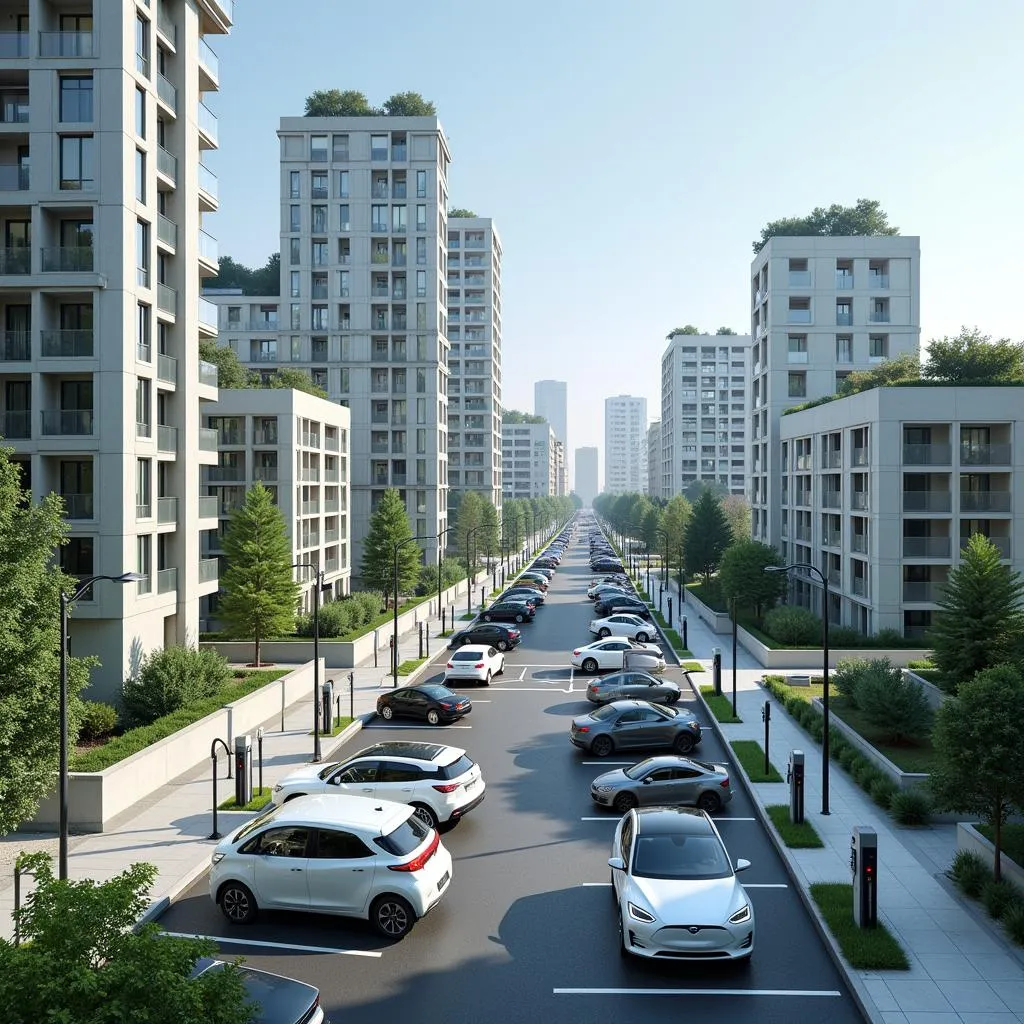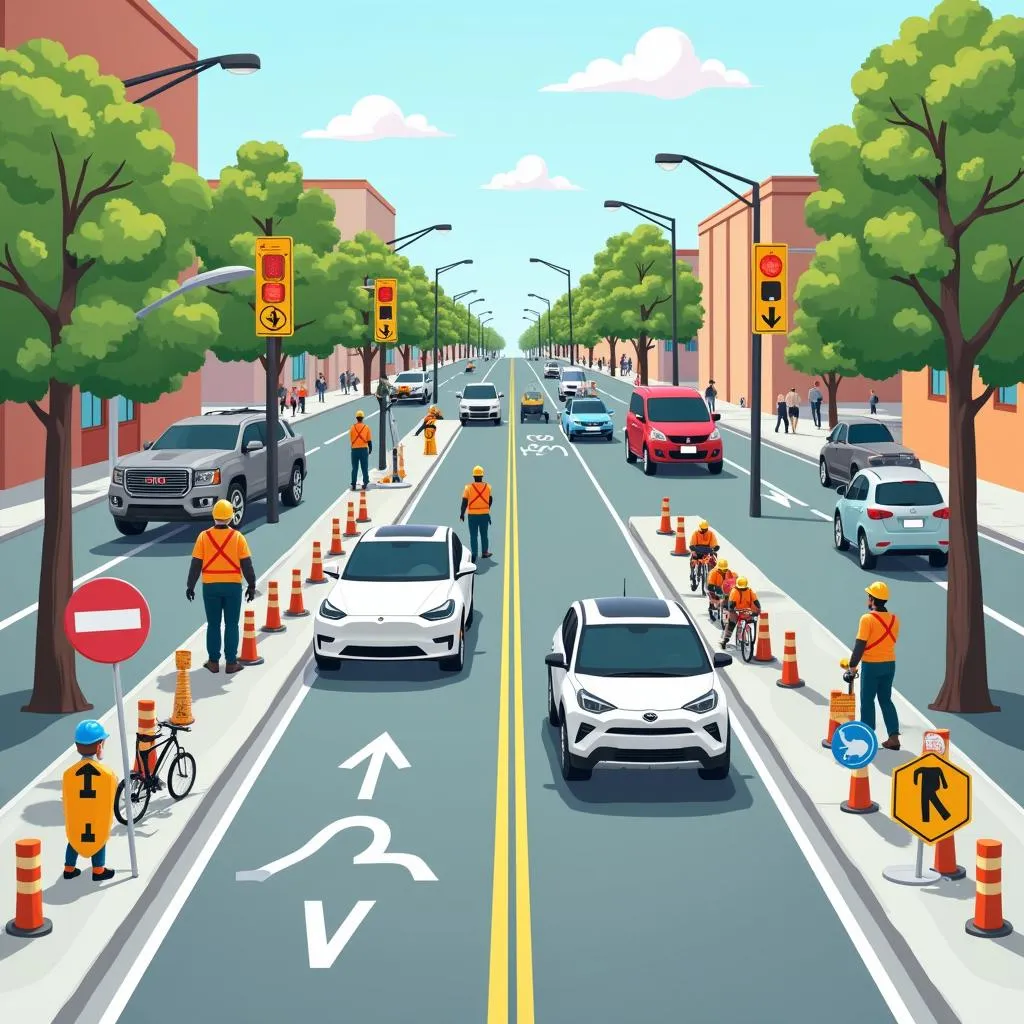The topic of electric vehicle adoption and its impact on urban planning has become increasingly relevant in recent years. This subject aligns closely with current global trends towards sustainable urban development and environmental conservation. Based on an analysis of past IELTS exams and current environmental concerns, it’s highly likely that this theme will continue to appear in future IELTS Writing Task 2 questions.
Let’s examine a potential IELTS Writing Task 2 question on this topic:
Some people believe that the increasing adoption of electric vehicles will have a significant impact on urban planning and infrastructure. To what extent do you agree or disagree with this statement?
Analysis of the Question
This question requires candidates to consider the relationship between the growing popularity of electric vehicles (EVs) and potential changes in urban planning and infrastructure. Key points to address include:
- The extent of agreement or disagreement with the statement
- Potential impacts of EV adoption on urban planning
- Changes in infrastructure that may be necessary to accommodate EVs
- Possible challenges and benefits of adapting urban areas for increased EV use
Now, let’s examine sample essays for different band scores, starting with a high-band response.
Sample Essay 1 (Band 8-9)
The widespread adoption of electric vehicles (EVs) is undoubtedly poised to revolutionize urban planning and infrastructure development. I strongly agree that this shift towards electrification will have far-reaching consequences for our cities, necessitating significant changes in how we design and manage urban spaces.
Firstly, the proliferation of EVs will require a comprehensive overhaul of our existing charging infrastructure. Cities will need to invest heavily in creating an extensive network of charging stations to support the growing number of electric vehicles on the roads. This could involve retrofitting existing parking structures, integrating charging points into street lighting systems, and developing new, dedicated EV charging hubs. Such changes will inevitably alter the urban landscape and require careful planning to ensure efficient use of space and resources.
Moreover, the shift to electric vehicles will likely influence traffic management systems and road design. As EVs become more prevalent, urban planners may need to consider implementing smart traffic systems that can optimize energy consumption and reduce congestion. This could involve the creation of dedicated EV lanes, similar to current bus lanes, or the development of intelligent road systems that can communicate with electric vehicles to improve traffic flow and energy efficiency.
The impact of electric cars on reducing air pollution is another crucial factor that will shape urban planning decisions. As cities strive to improve air quality, the adoption of EVs may lead to the redesign of urban spaces to prioritize pedestrian and cycling areas. This could result in more green spaces, wider sidewalks, and an overall reduction in space allocated to traditional vehicles, fundamentally altering the urban fabric.
However, it is important to acknowledge that these changes will not occur overnight and may present significant challenges. The transition to EV-friendly infrastructure will require substantial investment and careful long-term planning. Cities will need to balance the needs of EV users with those of traditional vehicle owners during this transition period, which could span several decades.
In conclusion, the impact of electric vehicle adoption on urban planning and infrastructure will be profound and multi-faceted. While the transition may be challenging, it presents an opportunity to create more sustainable, efficient, and livable urban environments. As such, I firmly believe that the increasing adoption of EVs will indeed have a significant and largely positive impact on the future of our cities.
(Word count: 374)
 Urban planning adapting to electric vehicle charging needs
Urban planning adapting to electric vehicle charging needs
Essay Analysis (Band 8-9)
This essay demonstrates excellence in addressing the task, coherence and cohesion, lexical resource, and grammatical range and accuracy:
-
Task Achievement: The essay fully addresses all parts of the task, presenting a clear position with well-developed ideas and relevant examples.
-
Coherence and Cohesion: Ideas are logically organized with clear progression throughout. Paragraphs are well-linked, and cohesive devices are used effectively.
-
Lexical Resource: A wide range of vocabulary is used accurately and appropriately, including topic-specific terms like “electrification,” “retrofitting,” and “intelligent road systems.”
-
Grammatical Range and Accuracy: The essay displays a wide range of complex structures used accurately, with only minor errors that do not impede communication.
Sample Essay 2 (Band 6-7)
I agree that the increasing use of electric vehicles will have a big impact on urban planning and infrastructure. This is because electric cars need different things from regular cars, and cities will have to change to meet these new needs.
One of the main ways electric cars will change cities is by needing more charging stations. Right now, most cars use gas stations, but electric cars need places to plug in and charge. This means cities will have to build many new charging points. They might put them in parking lots, on streets, or make special charging areas. This will change how cities look and how people use space in them.
Another way electric cars will affect urban planning is by changing how roads are designed. Electric cars are often quieter than regular cars, so cities might need to think about new ways to keep pedestrians safe. They might also need to make special lanes for electric cars or change traffic lights to work better with them.
Should governments promote electric vehicles through subsidies is an important question related to this topic. If governments do promote electric cars, it could lead to faster changes in cities. This might include more bike lanes and walking areas because electric cars are better for the environment.
However, these changes won’t happen quickly. It will take a lot of time and money to change cities for electric cars. Urban planners will need to think carefully about how to make these changes without causing too many problems for people who still use regular cars.
In conclusion, I believe that the growing number of electric vehicles will definitely change how cities are planned and built. While this will be challenging, it could also lead to cleaner and more efficient cities in the future.
(Word count: 296)
Essay Analysis (Band 6-7)
This essay demonstrates good task achievement, coherence, vocabulary, and grammar, but with some limitations:
-
Task Achievement: The essay addresses the main points of the task, presenting a clear position with some supporting ideas. However, the development of ideas is less comprehensive than in the Band 8-9 essay.
-
Coherence and Cohesion: The essay is generally well-organized, with clear progression of ideas. However, the use of cohesive devices is less sophisticated than in higher band essays.
-
Lexical Resource: A good range of vocabulary is used, with some attempt at using less common lexical items. However, there is less precision and sophistication compared to the Band 8-9 essay.
-
Grammatical Range and Accuracy: The essay uses a mix of simple and complex sentence structures with generally good control. There are some errors, but they do not impede communication.
 City adapting infrastructure for electric vehicles
City adapting infrastructure for electric vehicles
Key Vocabulary for IELTS Writing on Electric Vehicles and Urban Planning
-
Urban planning (noun, /ˈɜːbən ˈplænɪŋ/): The process of designing and organizing urban areas.
-
Infrastructure (noun, /ˈɪnfrəstrʌktʃə(r)/): The basic physical and organizational structures and facilities needed for the operation of a society or enterprise.
-
Electrification (noun, /ɪˌlektrɪfɪˈkeɪʃn/): The process of powering by electricity; the system of electric power distribution.
-
Charging station (noun, /ˈtʃɑːdʒɪŋ ˈsteɪʃn/): A place where electric vehicles can be recharged.
-
Retrofitting (verb, /ˌretrəʊˈfɪtɪŋ/): Adding new technology or features to older systems or structures.
-
Sustainable (adjective, /səˈsteɪnəbl/): Able to be maintained at a certain rate or level without depleting natural resources or causing ecological damage.
-
Smart traffic system (noun, /smɑːt ˈtræfɪk ˈsɪstəm/): An intelligent transportation system that uses technology to manage traffic flow efficiently.
-
Congestion (noun, /kənˈdʒestʃən/): A state of overcrowding and traffic jams in urban areas.
-
Air quality (noun, /eə(r) ˈkwɒləti/): The degree to which the air is suitable or clean for breathing.
-
Pedestrian-friendly (adjective, /pəˈdestriən ˈfrendli/): Designed to be safe and convenient for people walking.
Conclusion
The impact of electric vehicle adoption on urban planning is a highly relevant topic for IELTS Writing Task 2. It touches on several important themes such as sustainable development, environmental conservation, and technological advancement. To prepare for potential questions on this subject, candidates should:
- Stay informed about current trends in electric vehicle technology and adoption rates.
- Research how different cities are adapting their infrastructure to accommodate electric vehicles.
- Consider the challenges and benefits of transitioning to EV-friendly urban environments.
- Practice writing essays that discuss both the positive and negative impacts of this transition.
Why electric cars are essential for reducing pollution is another closely related topic that may appear in future IELTS exams. Candidates are encouraged to explore this theme as well.
For effective practice, try writing your own essay on the given topic or a related one, such as:
“Some people believe that governments should prioritize the development of infrastructure for electric vehicles over traditional transportation systems. To what extent do you agree or disagree?”
Share your practice essays in the comments section below for feedback and discussion with fellow IELTS candidates. This active engagement will help you refine your writing skills and prepare more effectively for the IELTS Writing Task 2.


